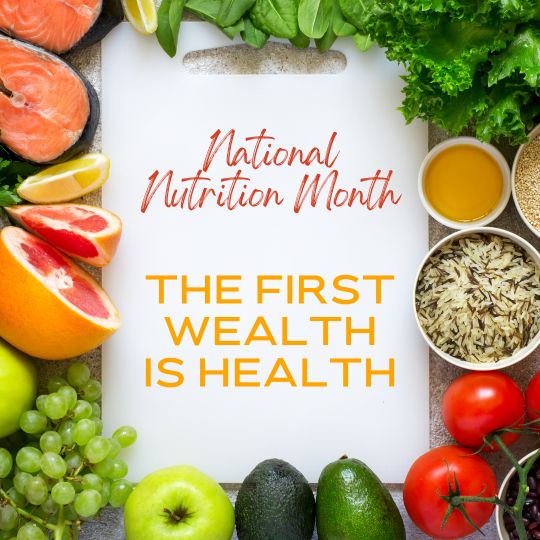It’s National Nutrition Month so it’s a good time to discuss nutritional deficiencies and how they can affect your health.
A nutrient deficiency is basically a nutrient, such as a vitamin or mineral, that your body does not have enough of to function properly.
What if you forgot to put enough oil in your car? Despite the fact that it was getting the air, gas, functioning spark plugs and good combustion, the car wouldn’t work properly. Sure, the piston would go up and down and the car would move forward – just like normal. But soon the engine might run a little hot.
Down in the engine different things might start happening. The rings around the piston that stopped oil from getting up into the combustion area might be giving way. The normal straight camshaft might start to bend a little. The engine just won’t work correctly, and you’ll have problems.
Perhaps the car will need a small repair, or maybe a major overhaul – or ignored, the engine will just seize up and “die”.
It’s the same with your body – except that you can’t just buy another engine, and repairs made to a damaged body might not put things fully back together again.
According to the National Institute on Aging, there are 13 essential vitamins — vitamins A, C, D, E, K, and the B vitamins (thiamine, riboflavin, niacin, pantothenic acid, biotin, B6, B12, and folate).
Vitamins have different jobs to help keep the body working properly. Some vitamins help you resist infections and keep your nerves healthy, while others may help your body get energy from food or help your blood clot properly.
Like vitamins, minerals also help your body function. Minerals are elements that our bodies need to function that can be found on the earth and in foods. Some minerals, like iodine and fluoride, are only needed in very small quantities. Others, such as calcium, magnesium, and potassium, are needed in larger amounts.
Let’s look at an example related to someone not consuming enough Vitamin C.
Gingivitis is created when plaque (sticky deposits of bacteria, mucus and food particles) adheres to the teeth, hardens and irritates the gum. The accumulation causes the gums to become infected and swollen. As the gums swell, pockets form between the gums and the teeth and act as a trap for more plaque. Irritated gums bleed and eventually start to recede. Gingivitis, untreated, can progress to periodontal disease, which can result in lost teeth and needing false teeth.
This irritation of the gums can be fought by introducing Vitamin C, which fights the formation of plaque.
Seems like it would be easier just to get enough C. Consuming enough Vitamin C would have fought the formation of plaque to begin with.
In the past, higher quality food sources allowed us to consume the vitamins and minerals the body needed for optimum functioning. Because commercial farmland today is extremely depleted of minerals, eating fresh fruits and vegetables no longer ensures you will receive the vitamins and minerals that your body needs to maintain health and vigor.
In addition, these days we live in a “fast food world” of processed foods with low nutrient value, and we are subjected to toxins from chemicals in the soil and pollution in the air. Many people have a compromised gut and so they cannot absorb enough of the nutrients from the foods they eat.
Some of the things we consume such as alcohol, coffee, and tobacco, to name a few, can also deplete the body of vitamins, such as Vitamin B12.
What happens when you have a deficiency of Vitamin B12? It can bring about nerve degeneration. Vitamin B12 supports the sheathing that protects nerve cells. Damage to the nerve sheathing can produce numbness, tingling and pain.
So, the bottom line is that if you are not consuming enough of the vitamins and minerals your body needs for optimum functioning, the result will be health issues.
What Can You Do?
Continue to eat a balanced diet of lean meat, fish, fresh fruits and vegetables, whole grains and legumes. Try to buy organic produce, or produce from a farmers’ market, whenever possible.
To support your body, take nutritional supplements that are of high-quality and plant-based.
Unfortunately, most of the vitamins and minerals one finds in drug stores and health food shops are usually just isolated man-made chemicals manufactured in pharmaceutical plants. They are not even close to the real vitamins and minerals found in fresh fruits and vegetables.
High-quality supplements, such as the Qgenics’ range of plant-based supplements, will help compensate for the missing nutrients in your diet and support your overall health.
Highest Quality Ingredients
Qgenics sources the highest quality, natural ingredients from around the world. We never use synthetic ingredients.
100% Natural Plant-based Ingredients
Scientific studies have demonstrated the nutritional and health benefits of natural plant sources. Plant-based ingredients support the World Health Organization report, Technical Series Report 916, page 42, which states, “We should eat a diet consistent with the diet our genes became programmed to respond to.” Genetically, our bodies are designed to respond to plant nutrition.
Cellinfusion™ Technology – Working at a cellular level to improve health
Many supplements are simply flushed out of the body. They are a waste of time and money. Qgenics’ formulations are designed to target cellular activity and move it closer to optimum functioning. Every product utilizes natural Cellinfusion™ Technology to promote maximum cellular absorption so you get better results and better value for your money.
Remember, when you build good health through good nutrition, disease tends to fade away.

